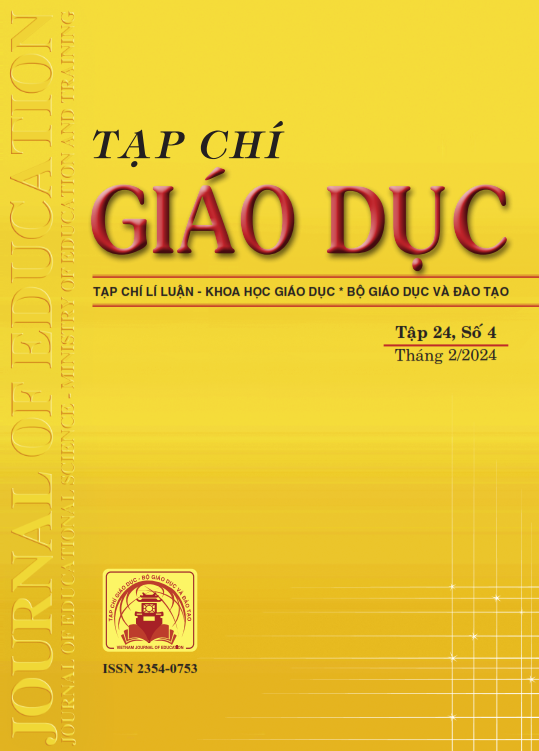Đánh giá kết quả phản hồi của Chatbot Bard trong thực hiện bài thi môn Địa lí kì thi tốt nghiệp trung học phổ thông Quốc gia Việt Nam từ năm 2019 đến năm 2023
Tóm tắt
The rapid development of Artificial Intelligence has brought about computer programs that simulate human conversations called Chatbots. Based on natural language processing and machine learning technology, Artificial Intelligence chatbots such as ChatGPT, Chatbot Bard can generate responses that match the context of the conversation. Artificial Intelligence chatbots have the potential to benefit education in many ways while also posing some challenges. The article focuses on evaluating the results of Chatbot Bard’s responses in the Geography test of the Vietnam National High School Graduation Examination. The results showed that Chatbot Bard provided accurate responses to the majority of questions and scored higher than the actual average student score. The response results of Chatbot Bard varied by topic and difficulty level of the question. In addition, the article discusses the accuracy of the feedback, ethical issues and users’ critical thinking. The article provides teachers and students with a detailed picture to use Chatbot Bard in teaching and learning effectively and appropriately.
Tài liệu tham khảo
Baker, R. S. (2021). Artificial intelligence in education: Bringing it all together. In Digital education outlook: Pushing the frontiers with AI, blockchain, and robots, 43-56.
Chinonso, O. E., Theresa, A. M.-E., & Aduke, T. C. (2023). ChatGPT for Teaching, Learning and Research: Prospects and Challenges. Global Academic Journal of Humanities and Social Sciences, 5(02), 33-40. https://doi.org/10.36348/gajhss.2023.v05i02.001
Clark, T. M. (2023). Investigating the Use of an Artificial Intelligence Chatbot with General Chemistry Exam Questions. Journal of Chemical Education, 100(5), 1905-1916. https://doi.org/10.1021/acs.jchemed.3c00027
Deng, X., & Yu, Z. (2023). A meta-analysis and systematic review of the effect of chatbot technology use in sustainable education. Sustainability, 15(4), 2940. https://doi.org/10.3390/su15042940
Dimitriadis, G. (2020). Evolution in Education: Chatbots. Homo Virtualis, 3(1), 47-54. https://doi.org/10.12681/homvir.23456
Harry, A. (2023). Role of AI in Education. Interdiciplinary Journal and Hummanity (INJURITY), 2(3), 260-268. https://doi.org/10.58631/injurity.v2i3.52
Kalla, D., & Smith, N. (2023). Study and Analysis of Chat GPT and its Impact on Different Fields of Study. International Journal of Innovative Science and Research Technology, 8(3), 827-833.
Khademi, A. (2023). Can ChatGPT and Bard generate aligned assessment items? A reliability analysis against human performance. Journal of Applied Learning and Teaching, 6(1), 75-80. https://doi.org/10.37074/jalt.2023.6.1.28
Kooli, C. (2023). Chatbots in Education and Research: A Critical Examination of Ethical Implications and Solutions. Sustainability (Switzerland), 15(7), 1-15. https://doi.org/10.3390/su15075614
Kuhail, M. A., Alturki, N., Alramlawi, S., & Alhejori, K. (2023). Interacting with educational chatbots: A systematic review. Education and Information Technologies, 28(1), 973-1018. https://doi.org/10.1007/s10639-022-11177-3
Lê Anh Vinh, Bùi Thị Diển, Lê Quang Quân, Vũ Văn Luân (2023). Khả năng thực hiện bài kiểm tra định kì môn Toán và môn Ngữ văn cấp Trung học của công cụ ChatGPT: Kết quả nghiên cứu và một số khuyến nghị ban đầu. Tạp chí Khoa học Giáo dục Việt Nam, 19(2), 1-10. https://doi.org/10.15625/2615-8957/12310201
Limna, P., Kraiwanit, T., Jangjarat, K., Klayklung, P., & Chocksathaporn, P. (2023). The use of ChatGPT in the digital era: Perspectives on chatbot implementation. Journal of Applied Learning and Teaching, 6(1), 64-74. https://doi.org/10.37074/jalt.2023.6.1.32,1-10
Phạm Đỗ Nhật Tiến (2023). Trí tuệ nhân tạo trong giáo dục và ChatGPT: các khuyến nghị chính sách và vấn đề đặt ra với Việt Nam. Tạp chí Quản lí giáo dục, 15(7), 1-8. https://doi.org/10.53750/jem23.v15.n7.1
Rahman, M. M., & Watanobe, Y. (2023). ChatGPT for Education and Research: Opportunities, Threats, and Strategies. Applied Sciences (Switzerland), 13(9), 1-21. https://doi.org/10.3390/app13095783
Su, J., & Yang, W. (2023). Unlocking the Power of ChatGPT: A Framework for Applying Generative AI in Education. ECNU Review of Education, 6(3), 355-366. https://doi.org/10.1177/20965311231168423
Suta, P., Lan, X., Wu, B., Mongkolnam, P., & Chan, J. H. (2020). An overview of machine learning in chatbots. International Journal of Mechanical Engineering and Robotics Research, 9(4), 502-510. https://doi.org/10.18178/ijmerr.9.4.502-510
Thái Thị Cẩm Trang (2023). Thái độ và kì vọng của sinh viên sư phạm tiếng Anh đối với ChatGPT: nghiên cứu tại Trường Đại học Sư phạm Hà Nội. Tạp chí Giáo dục, 23(10), 51-56.
UNESCO (2023a). Education in the age of artificial intelligence. https://courier.unesco.org/en/subscribe
UNESCO (2023b). Guidance for generative AI in education and research. https://unesdoc.unesco.org/ ark:/48223/pf0000386693?posInSet=3&queryId=dbe7dce2-f99b-46c0-8ecb-1065f0424366
UNESCO (2023c). Harnessing the Era of Artificial Intelligence in Higher Education A Primer for Higher Education Stakeholders. http://en.unesco.org/open-access/terms-use-ccbysa-en
Tải xuống
Đã Xuất bản
Cách trích dẫn
Số
Chuyên mục
Giấy phép

Tác phẩm này được cấp phép theo Ghi nhận tác giả của Creative Commons Giấy phép quốc tế 4.0 .












